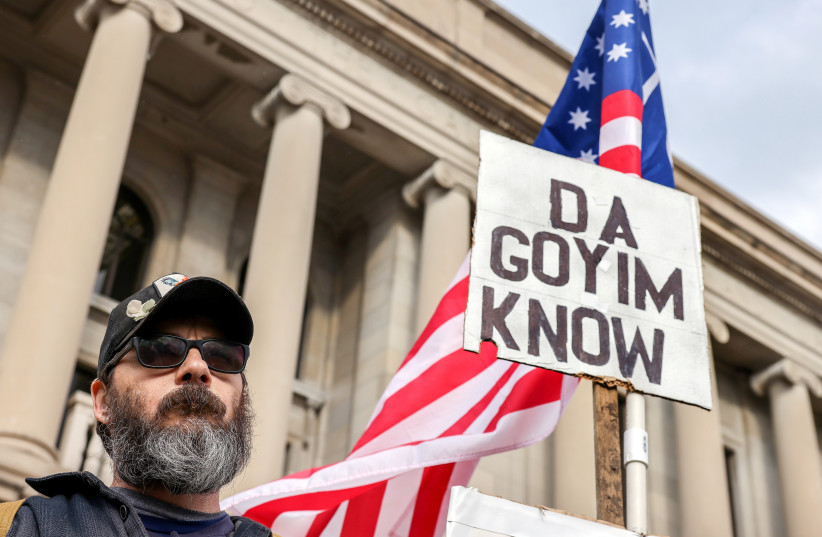Antisemitic rhetoric is reaching a tipping point in the US.
The prevalence of anti-Jewish rhetoric over the past months as well as a number of high-profile antisemitic incidents are unlike the antisemitic milieu in Europe, the Middle East or elsewhere.
In Europe, Jewish institutions, such as synagogues, have often been surrounded by security and Jews have been targeted by Islamist groups, far-left extremists and neo-Nazi-style antisemitism – but in the US the situation is different.
The recent news stories about former US president Donald Trump meeting people who made antisemitic comments and the way this is becoming mainstream in the media is a disturbing trend.
The rise of openly antisemitic rhetoric in the US is taking place as a new presidential election cycle begins. It is also happening on social media and in other formats. While it’s true that major media outlets and most people appear to reject this rhetoric, it’s also true that millions of people are being exposed to it.

The antisemitic rhetoric surrounding Kanye West’s recent statements, for instance, has now become a near 24-hour media cycle for two months. It’s hard to imagine a more dangerous time for the rhetoric to become mainstream and reach a tipping point.
A tipping point is defined as what happens when a series of small changes or incidents becomes significant enough to cause a larger, more important change.
Let’s look at some of the series of small events that may contribute to this tipping point.
Small antisemitic incidences
In New York City there are antisemitic physical assaults on Jews every week, according to reports. The ADL said that there was a 24% increase in incidents compared to 2020, for a total of 416 incidents in 2021. Not all of these are assaults.
However, New York leads the country in attacks on Jews. It is supposed to be a liberal democratic diverse city, run for many years until 2021 by left-leaning mayor Bill De Blasio. So why were there more assaults last year than ever recorded before in the city? Why are Jews attacked every week?
The Jewish community was the target of more than half (54%) of all religious bias crimes in 2021 according to the FBI. This means that half of all hate crimes targeting religious groups, target Jews. And yet Jews make up only a very small percent of the US population: less than 3% of adults.
We are generally conditioned to accept this as normal in America. An assault a week in New York, a killing here and there, swastikas from time to time – all of that is considered normal. No other minority group is subjected to such systematic attacks and hatred as Jews, who per capita are subjected to hate crimes far more than any other group.
The mainstreaming of hatred of Jews is part of the story here. There are no protests in New York or anywhere else against hate crimes against Jews. Groups can openly parade down streets shouting antisemitic slogans and people are told to keep quiet.
In late November, The Jerusalem Post reported that “hundreds of followers of the Black Hebrew Israelite [BHI] movement marched through New York City in support of basketball player Kyrie Irving, who returned from suspension after he had shared a link on social media to a documentary that advocates BHI theological claims that people of African descent are the real Jews. According to a JTA article he “shared a link to Hebrews to Negroes: Wake Up Black America, a 2018 film that contains a host of antisemitic tropes and that is based on a book that, no doubt thanks to Irving, is now a bestseller.”
In an incident in Arizona, a graduate student murdered a professor after making antisemitic threats. “The threats were previously known and reported, but not enough was done to avoid yet another deadly campus shooting,” Azcentral.com reported. Again and again, it seems that authorities don’t take these threats seriously.
The main tipping point comes due to the amplification of these views in major traditional media and social media. Twitter has now suspended Kanye West’s Twitter account, which had 32 million followers. This comes after he appeared on Alex Jones’ far-Right InfoWars website and praised Hitler. One video of the appearance on the show has received more than two million views on Twitter. West, who is now called Ye, had posted a Star of David with a swastika inside of it on Twitter before being suspended. News about West was one of the top trending topics on CNN’s website on Saturday.
The news cycle of antisemitism has been flooding people’s homes with anti-Jewish views for two months now, since early October. Whenever a celebrity makes antisemitic comments they are then amplified by media and there are numerous interviews.
It is difficult not to see a pattern here. According to an October 11 report at the The Hill “Ye, the artist formerly known as Kanye West, made several antisemitic remarks… in unaired portions of his recent interview with Fox News host Tucker Carlson.”
However, that wasn’t the only major interview. Throughout October and November, numerous hosts on various media sought out the “controversy” of interviewing someone who would say “controversial” antisemitic things.
The tipping point comes because today, antisemitism is the “cool” thing that radio hosts and media people want to have on their shows in order to get maximum ratings and clicks. This is more than just “shock jock” culture.
The reason we are seeing a tipping point is because media isn’t rushing to interview people with homophobic or other types of racist views. There is only one group whose hatred they want to amplify.
Of course, they are “against” antisemitism. However, the most “controversial” antisemitic rhetoric is being amplified daily. How many millions of people who are being exposed to this are now beginning to think that the usual filters they might have can be taken off?
